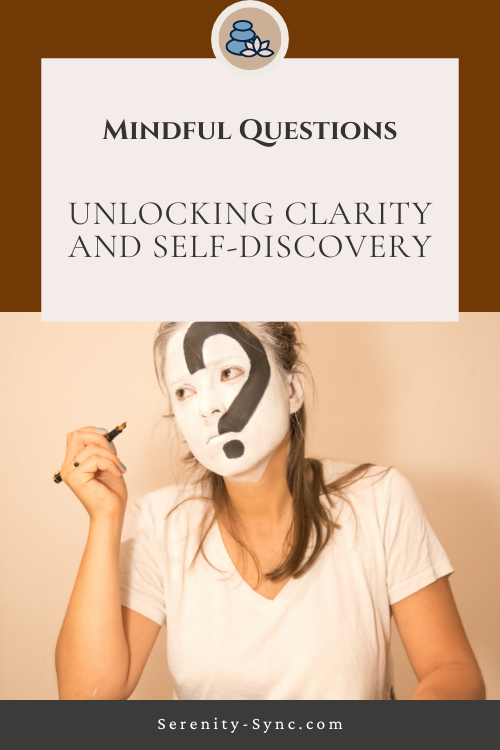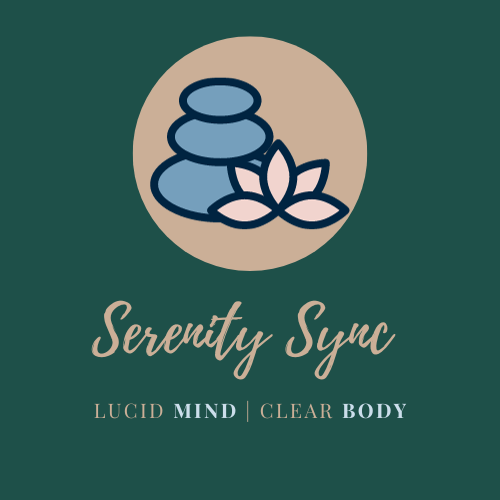In Brief
Mindful questions have the power to bring peace and clarity amidst the chaos of everyday life. By practicing mindfulness and asking thoughtful questions, we can gain new perspectives, understand ourselves better, and improve our relationships. This article explores the definition and purpose of mindful reflection, the benefits it brings, and a comprehensive guide to asking mindful questions. We will also learn how to prepare for mindful self-reflection and explore the transformative practice of box breathing. Get ready to embark on a journey of self-discovery and unlock the power of mindful questions.

Your Free PDF version of this blog post Awaits – No Strings, Just Click and Enjoy! 🌸🎁![]()
Introduction
Life can be chaotic. From the moment we wake up to the moment we go to bed, we are bombarded with endless tasks, responsibilities, and distractions. It’s no wonder that many of us feel overwhelmed and disconnected from ourselves and others. But what if there was a way to find clarity and peace amidst the chaos? Enter mindful questions.
Mindful questions are a powerful tool for self-reflection and self-discovery. By asking ourselves thoughtful and intentional questions, we can gain new insights, challenge limiting beliefs, and deepen our understanding of ourselves and others. In this article, we’ll explore the transformative power of mindful questions and how they can unlock clarity and self-discovery.
Mindful Reflection: Delving into Self-Discovery
Definition and Purpose of Mindful Reflection
Mindful reflection is the practice of turning inward and examining our thoughts, emotions, and experiences with curiosity and non-judgment. It involves slowing down, being present in the moment, and asking ourselves deep and meaningful questions. The purpose of mindful reflection is to gain self-awareness, challenge our assumptions, and foster personal growth.
Breaking Free from Self-Imposed Roadblocks
Often, we are our own worst enemy. We hold onto limiting beliefs, negative self-talk, and destructive patterns that prevent us from reaching our full potential. Mindful reflection allows us to identify these roadblocks and explore alternative perspectives. By asking ourselves probing questions, we can challenge our assumptions and break free from self-imposed limitations.
The Role of a Therapist in Asking Mindful Questions
While self-reflection is a powerful practice, sometimes we need the guidance of a therapist to help us delve deeper into our thoughts and emotions. Therapists are trained to ask mindful questions that encourage self-exploration and facilitate personal growth. They provide a safe space for us to explore our innermost thoughts and feelings, offering insights and perspectives that we may not have considered on our own.
Benefits of Mindful Reflection: Unleashing Your Potential
Cultivating Self-Awareness Without Judgment
Self-awareness is the foundation of personal growth and transformation. By practicing mindful reflection, we can become more aware of our thoughts, emotions, and behaviors without judgment. This non-judgmental awareness allows us to observe ourselves objectively and make conscious choices that align with our values and goals.
Managing Emotions Effectively
Emotions can be overwhelming and confusing. Mindful reflection gives us the tools to navigate our emotions with grace and compassion. By asking ourselves questions like “What am I feeling?” and “Why am I feeling this way?”, we can develop emotional resilience and learn to manage our emotions effectively.
Reducing Stress and Gaining New Perspectives
Life is full of stressors, but how we perceive and respond to them can make all the difference. Mindful reflection helps us gain new perspectives and reframe stressful situations. By asking ourselves questions like “What can I learn from this?” and “How can I grow from this experience?”, we can reduce stress and approach challenges with a growth mindset.
Prioritizing and Making Decisions Aligned with Values
In a world filled with endless options and distractions, it can be challenging to prioritize and make decisions that align with our values. Mindful reflection allows us to clarify our values and evaluate our choices with intention. By asking ourselves questions like “Does this align with my values?” and “Will this bring me closer to my goals?”, we can make decisions that are authentic and fulfilling.
Challenging Limiting Beliefs and Gaining Insights
We all have limiting beliefs that hold us back from reaching our full potential. Mindful reflection helps us identify these beliefs and challenge them with curiosity and compassion. By asking ourselves questions like “Is this belief serving me?” and “What evidence do I have to support or challenge this belief?”, we can gain insights and reframe our mindset for growth and success.
Enhancing Relationships and Understanding Others
Relationships are the heart of human connection, but they can also be a source of conflict and misunderstanding. Mindful reflection allows us to deepen our understanding of others and foster empathy and compassion. By asking ourselves questions like “How can I better understand this person’s perspective?” and “What can I do to improve this relationship?”, we can enhance our relationships and build stronger connections.
Living a More Intentional and Purposeful Life
Many of us go through life on autopilot, going through the motions without a sense of purpose or direction. Mindful reflection helps us live with intention and purpose by bringing awareness to our actions and choices. By asking ourselves questions like “What am I grateful for?” and “What can I do today that aligns with my purpose?”, we can live a more fulfilling and meaningful life.
Fun Fact
Mindfulness meditation has been scientifically proven to have numerous benefits, including reducing stress, improving focus and attention, and enhancing overall well-being. It’s like a workout for your brain, helping you build mental resilience and navigate life’s challenges with greater ease.
Mindful Questions: A Step-by-Step Guide
Preparing for Mindful Self-Reflection with Box Breathing
Before diving into mindful self-reflection, it’s important to create a calm and focused state of mind. One technique that can help is box breathing. Box breathing is a simple yet powerful breathing exercise that involves inhaling, holding the breath, exhaling, and holding again in a rhythmic pattern. By practicing box breathing, we can calm our nervous system and prepare ourselves for deep self-reflection.
Step-by-Step Guide for Box Breathing Technique
1. Find a quiet and comfortable space where you won’t be disturbed.
2. Sit in a relaxed position with your feet planted firmly on the ground and your hands resting on your lap.
3. Close your eyes and take a deep breath in through your nose, counting to four.
4. Hold your breath for a count of four.
5. Slowly exhale through your mouth, counting to four.
6. Hold your breath for a count of four.
7. Repeat this pattern for several minutes, focusing on the sensation of your breath and the rhythm of the counts.
8. When you’re ready, gently open your eyes and begin your mindful self-reflection.
Fun Fact
Did you know that the Dalai Lama, known for his wisdom and mindfulness, once said, “If you want others to be happy, practice compassion. If you want to be happy, practice compassion.” This highlights the power of mindfulness in fostering empathy and connection with others.
Mindful Questions for Self-Reflection: Exploring the Depths
Mindful self-reflection is a powerful tool for gaining self-awareness, fostering personal growth, and enhancing emotional resilience. Whether you’re an adult or a child, asking mindful questions can help you delve deep into your thoughts and feelings, uncover limiting beliefs, and gain clarity on your values and desires. Let’s explore some mindful questions for self-reflection for both adults and children.
Mindful Questions for Self-Reflection – Adults
When do I feel most connected to myself?
Take a moment to reflect on the activities, experiences, or situations that make you feel most connected to your true self. It could be engaging in a hobby, spending time in nature, or simply being alone with your thoughts. By identifying these moments, you can create more opportunities to nurture that sense of connection and authenticity in your life.
What are my primary stressors, and how do they manifest in my body?
Stress is a part of life, but it’s essential to understand what triggers your stress and how it affects you physically. Notice any tension, headaches, or other physical sensations that arise when you’re stressed. By recognizing these stressors and their physical manifestations, you can develop coping strategies and explore stress reduction techniques that work for you.
How can I cultivate self-compassion?
Self-compassion is vital for maintaining emotional well-being and resilience. Ask yourself how you can be kinder and more understanding towards yourself. What words of encouragement or self-soothing practices can you incorporate into your daily life? By practicing self-compassion, you can navigate challenges with greater ease and build a positive relationship with yourself.
What is my relationship with failure, and how does it impact my growth?
Failure is a natural part of life and an opportunity for growth. Reflect on your attitude towards failure and how it affects your willingness to take risks and learn from setbacks. Are there any limiting beliefs or self-judgments holding you back? By shifting your perspective on failure and embracing a growth mindset, you can turn failures into valuable learning experiences.
How can I align my actions with my values?
Values serve as guiding principles that shape our actions and decisions. Take some time to reflect on your core values and whether your current behaviors align with them. Are there any areas of your life where you feel a disconnect? By aligning your actions with your values, you can lead a more authentic and fulfilling life.
Mindful Questions for Self-Reflection – Children
What makes me feel calm and happy?
Encourage children to explore their emotions and identify activities or experiences that bring them a sense of calm and happiness. It could be playing with friends, engaging in creative pursuits, or spending time with family. By understanding their own emotional needs, children can learn to prioritize self-care and engage in activities that nourish their well-being.
How can I show kindness to others?
Teaching children the value of kindness is essential for fostering empathy and compassion. Ask them to reflect on different ways they can show kindness to others, such as sharing, listening, or offering help. By practicing kindness, children can contribute to a more harmonious and supportive environment.
What are my unique strengths and talents?
Help children discover their strengths and talents by encouraging them to reflect on their abilities and interests. What activities do they excel at? What do they enjoy doing? By nurturing their unique talents, children can build self-confidence and develop a sense of purpose.
How can I manage my emotions effectively?
Emotional intelligence is a crucial skill for children to develop. Encourage them to reflect on their emotions and how they can effectively manage them. Are there any triggers that frequently lead to strong emotions? What strategies can they use to calm themselves down? By teaching children to understand and regulate their emotions, you’re empowering them to navigate life’s challenges with greater emotional resilience.
What brings me a sense of purpose and fulfillment?
Help children explore their passions and interests to uncover what brings them a sense of purpose and fulfillment. What activities or causes ignite their enthusiasm? By encouraging them to pursue their passions, children can cultivate a sense of meaning and contribute to the world in a way that aligns with their values.
Conclusion: Embrace Mindful Living
Mindful questions have the power to unlock clarity and self-discovery. By incorporating mindful self-reflection into our lives, we can gain a deeper understanding of ourselves, improve our relationships, and make more informed decisions. The practice of asking mindful questions requires patience, curiosity, and a willingness to explore our inner world. Let’s embrace mindful living and embark on a journey of self-discovery, one question at a time.
Fun Fact
Did you know that the concept of mindfulness has roots in ancient Eastern philosophy and Buddhist teachings? It has been practiced for thousands of years as a way to cultivate awareness, compassion, and inner peace.


1 thought on “Mindful Questions: Unlocking Clarity and Self-Discovery”